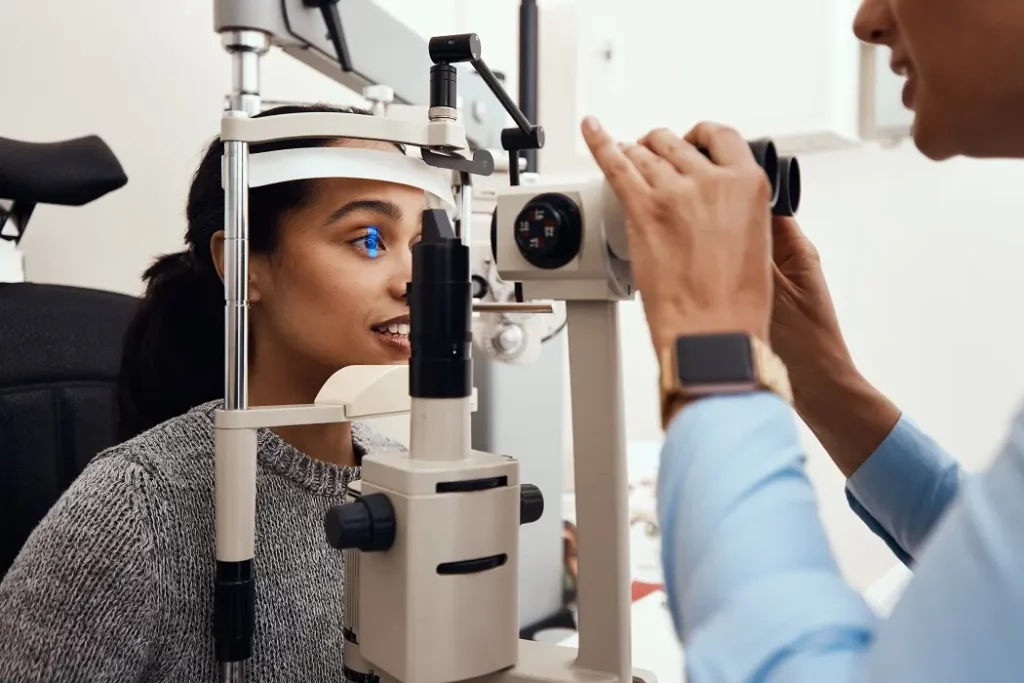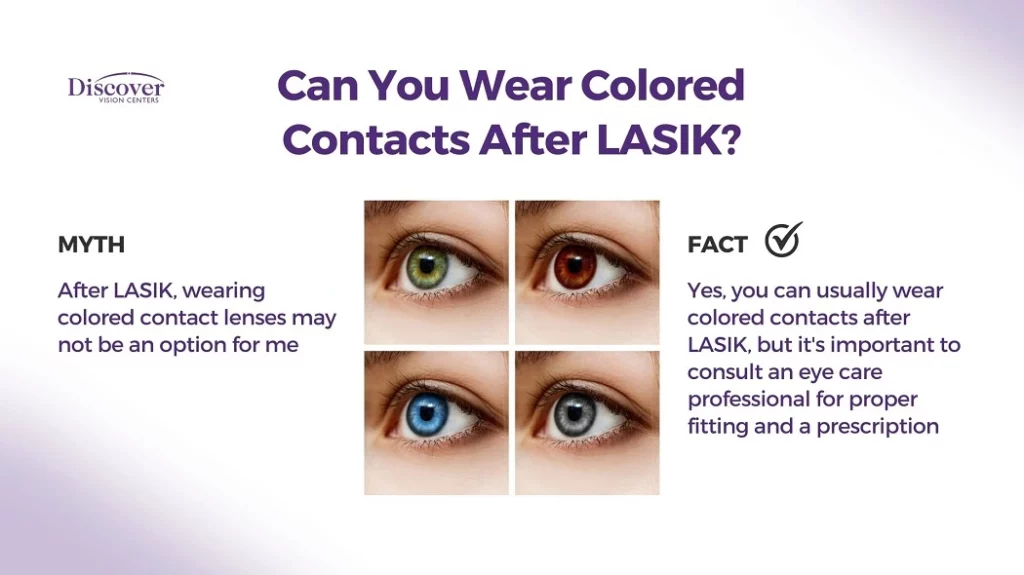
Updated: February 09, 2024

One frequently asked question about refractive surgery is, “Can I wear contact lenses after LASIK?” LASIK typically aims to eliminate the need for glasses or contacts. Wearing contact lenses post-LASIK provides flexibility for vision correction and can enhance visual acuity. However, it may be needed for specific conditions or preferences beyond surgery. Nonetheless, there are situations where contact lenses could remain a viable option after LASIK, especially for cosmetic reasons. There are a few scenarios where you might want this option.
Wearing contact lenses after LASIK is generally safe, although it’s essential to follow your eye care professional’s recommendations. LASIK, or Laser-Assisted In Situ Keratomileusis, is a surgical procedure used to reshape the cornea and correct vision problems like nearsightedness, and astigmatism. While LASIK can provide significant vision improvement, some individuals may still experience minor visual issues or need vision correction for specific tasks.

Contact lenses offer several advantages for select post-LASIK patients. First, they can provide additional vision enhancement for individuals with residual refractive errors. This flexibility can be beneficial for those seeking crisp vision at various distances.
Additionally, contact lenses can be an excellent choice for athletes or individuals with active lifestyles who prefer not to wear glasses during physical activities.
However, it’s crucial to consult with your eye care professional before wearing contact lenses after LASIK. They will evaluate your eye health and provide guidance on the appropriate lens type and wearing schedule. Regular eye exams are essential to ensure the continued safety and efficacy of contact lens wear following LASIK. In most cases, the combination of LASIK and contact lenses can be a secure and effective vision correction solution.
Scleral lenses, for example, can help maintain a stable tear film and reduce the symptoms of severe dry eye. Soft contact lenses can be used as therapeutic lenses after mechanical trauma or recurrent erosions of the front surface of the eye. Medically approved soft contact lenses serve as a bandage against the shearing forces of the eyelid when blinking.
Contact lenses for lasik patients may be used for residual refractive error.
For severe astigmatism that cannot be fully corrected with surgery, contact lenses are an option to further refine and improve vision.

High refractive errors may persist after LASIK, necessitating contact lens wear for precise vision correction. Consult your eye specialist for tailored guidance on post-surgery contact lens options.
Moreover, contact lenses can be used to address issues such as dry eye or irregular shaped corneas.
After undergoing LASIK surgery, which often provides excellent distance vision, many individuals encounter difficulty focusing on close-up objects due to presbyopia, an age-related vision condition. While there are numerous, effective vision corrective procedures, some patients opt to choose alternative options. Fortunately, a range of contact lens options exists to effectively manage presbyopia following LASIK, enabling individuals to enjoy clear vision for both near and distant tasks.
Consider the following contact lens types to address presbyopia after LASIK:
These contact lens options should be discussed with your trusted eye care professional. They will assess your unique visual needs and prescribe the most suitable solution to ensure comfortable, clear, and precise vision for all tasks after LASIK surgery, effectively addressing the challenges posed by presbyopia.
Alternative presbyopia treatments, such as Refractive Lens Exchange (RLE) and Modified Monovision refractive surgery, offer options beyond traditional reading glasses or multifocal contact lenses for age-related near vision challenges.

Yes, you can wear cosmetic contact lenses after LASIK surgery once your eyes have fully healed. Many wonder, “how long after lasik can I wear colored contacts?” Typically, a few weeks post-operation. Colored contacts provide a fun and cosmetic way to enhance or change your eye color while enjoying the benefits of LASIK-corrected vision. Ensure you follow proper hygiene and care guidelines to maintain eye health and comfort. Always consult your eye care professional for recommendations.
After LASIK, individuals may explore a variety of contact lens choices to address specific visual needs or preferences. The best contact lenses after lasik surgery should be tailored to individual needs. These options include:
Consult your eye care professional to determine the most suitable contact lens type based on your unique post-LASIK vision requirements.
Glasses can be a straightforward and effective solution for post-LASIK patients under certain circumstances. While LASIK surgery generally offers excellent distance vision correction, some individuals may still experience issues with near vision due to presbyopia, a common age-related condition. In such cases, wearing reading glasses can be a simple and practical way to address these close-up vision needs. Additionally, glasses provide a convenient option for individuals who prefer not to wear contact lenses or have any residual refractive errors post-surgery.
However, the need for glasses can vary among individuals, and some may opt for multifocal or progressive lenses to manage both near and distance vision. Consultation with an eye care professional is essential to determine the most suitable vision correction method post-LASIK, whether it’s glasses, contact lenses, or a combination of both, to ensure optimal visual comfort and clarity.
For individuals seeking further vision refinement or experiencing changes in their vision after initial LASIK procedures, LASIK enhancement can offer a viable solution. LASIK enhancement, also known as retreatment, involves a secondary laser eye surgery to fine-tune the results of the initial procedure. This option is valuable for addressing residual refractive errors, changes in vision over time, or enhancing vision beyond the primary LASIK surgery. Consult with an experienced eye surgeon to determine if LASIK enhancement is a suitable choice for achieving your desired visual outcome.